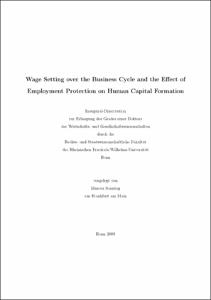Sonntag, Marcus: Wage Setting over the Business Cycle and the Effect of Employment Protection on Human Capital Formation. - Bonn, 2009. - Dissertation, Rheinische Friedrich-Wilhelms-Universität Bonn.
Online-Ausgabe in bonndoc: https://nbn-resolving.org/urn:nbn:de:hbz:5-18480
Online-Ausgabe in bonndoc: https://nbn-resolving.org/urn:nbn:de:hbz:5-18480
@phdthesis{handle:20.500.11811/4004,
urn: https://nbn-resolving.org/urn:nbn:de:hbz:5-18480,
author = {{Marcus Sonntag}},
title = {Wage Setting over the Business Cycle and the Effect of Employment Protection on Human Capital Formation},
school = {Rheinische Friedrich-Wilhelms-Universität Bonn},
year = 2009,
month = sep,
note = {This dissertation is about labor market institutions and their implications on allocative outcomes. The first chapter studies the effect of the business cycle on the setting of entry-wages, i.e. wages that people get at the start of a new job. The author estimates the elasticity of entry wages with respect to aggregate productivity, using data from the Current Population Survey of the United States. The entry wage is especially important as it behaves proportionately to the present discounted value of the expected sum of total wage payments that a worker will receive in the lifetime of a job. Therefore, entry wages are allocative and influence the extent of vacancy creation. The analysis shows that entry wages react strongly to fluctuations in aggregate productivity. This has important consequences for flow models of the labor market.
The second and third chapters take a closer look at a specific labor market institution: employment protection. It is often argued that firms will invest more in their employees' human capital if they cannot lay them off easily when the economic situation worsens. The second chapter examines this hypothesis using a model of human capital accumulation and the labor market. The model is calibrated to an economy without employment protection. Numerical methods are used to tudy the effects of the introduction of a firing tax and severance payments. In doing so, the paper shows that a moderate firing tax indeed has a positive impact on the firms' incentives to organize on-the-job training for their employees, but at the cost of reducing firms' profits. The third chapter provides some empirical evidence on the interrelations between employment protection and on-the-job training in Germany. The analysis uses data from the Qualification-and-Career Survey and applies the method of difference-in-differences. The evidence corroborates the theoretical results.},
url = {https://hdl.handle.net/20.500.11811/4004}
}
urn: https://nbn-resolving.org/urn:nbn:de:hbz:5-18480,
author = {{Marcus Sonntag}},
title = {Wage Setting over the Business Cycle and the Effect of Employment Protection on Human Capital Formation},
school = {Rheinische Friedrich-Wilhelms-Universität Bonn},
year = 2009,
month = sep,
note = {This dissertation is about labor market institutions and their implications on allocative outcomes. The first chapter studies the effect of the business cycle on the setting of entry-wages, i.e. wages that people get at the start of a new job. The author estimates the elasticity of entry wages with respect to aggregate productivity, using data from the Current Population Survey of the United States. The entry wage is especially important as it behaves proportionately to the present discounted value of the expected sum of total wage payments that a worker will receive in the lifetime of a job. Therefore, entry wages are allocative and influence the extent of vacancy creation. The analysis shows that entry wages react strongly to fluctuations in aggregate productivity. This has important consequences for flow models of the labor market.
The second and third chapters take a closer look at a specific labor market institution: employment protection. It is often argued that firms will invest more in their employees' human capital if they cannot lay them off easily when the economic situation worsens. The second chapter examines this hypothesis using a model of human capital accumulation and the labor market. The model is calibrated to an economy without employment protection. Numerical methods are used to tudy the effects of the introduction of a firing tax and severance payments. In doing so, the paper shows that a moderate firing tax indeed has a positive impact on the firms' incentives to organize on-the-job training for their employees, but at the cost of reducing firms' profits. The third chapter provides some empirical evidence on the interrelations between employment protection and on-the-job training in Germany. The analysis uses data from the Qualification-and-Career Survey and applies the method of difference-in-differences. The evidence corroborates the theoretical results.},
url = {https://hdl.handle.net/20.500.11811/4004}
}






